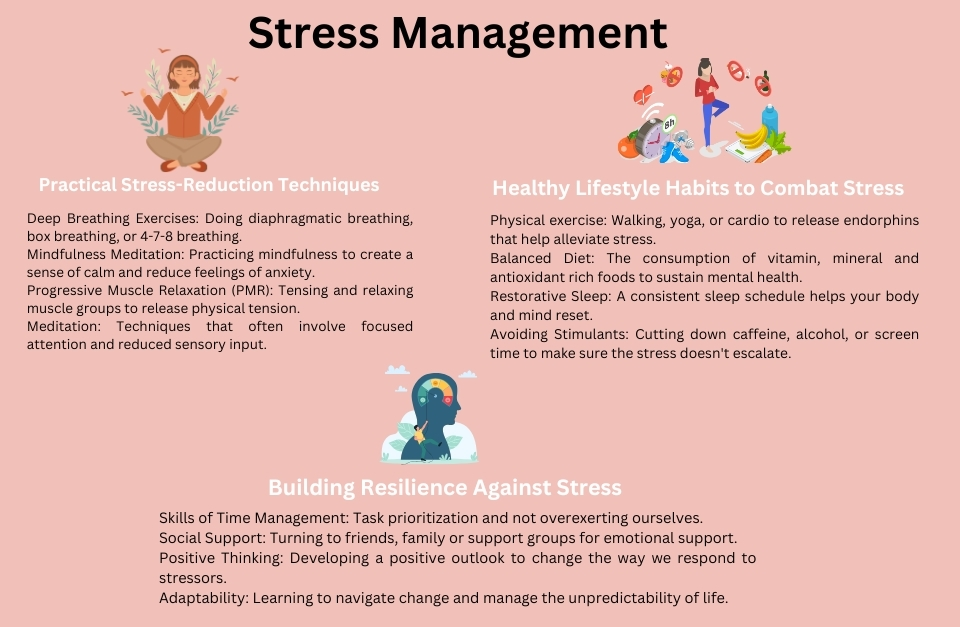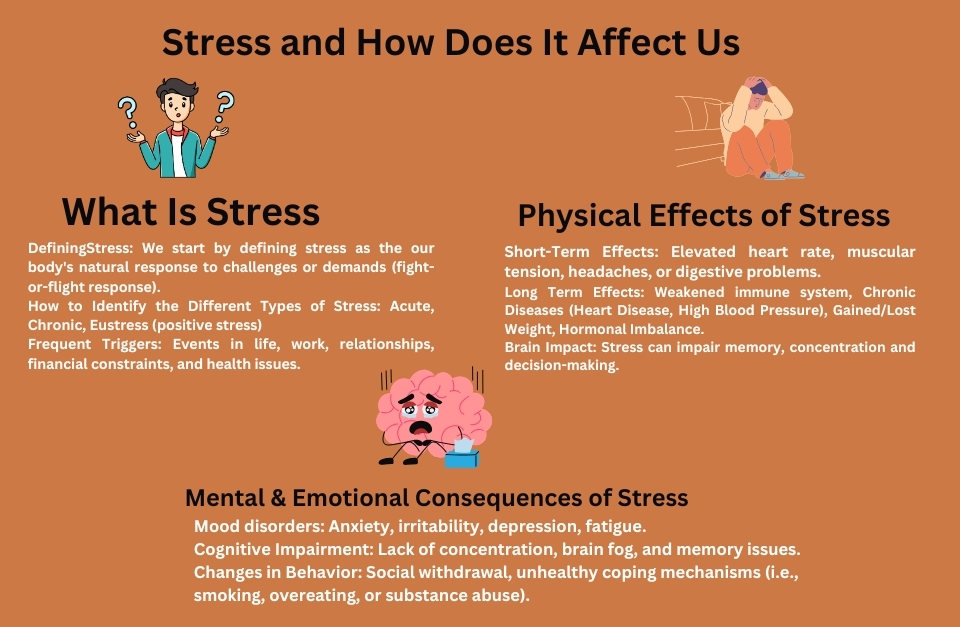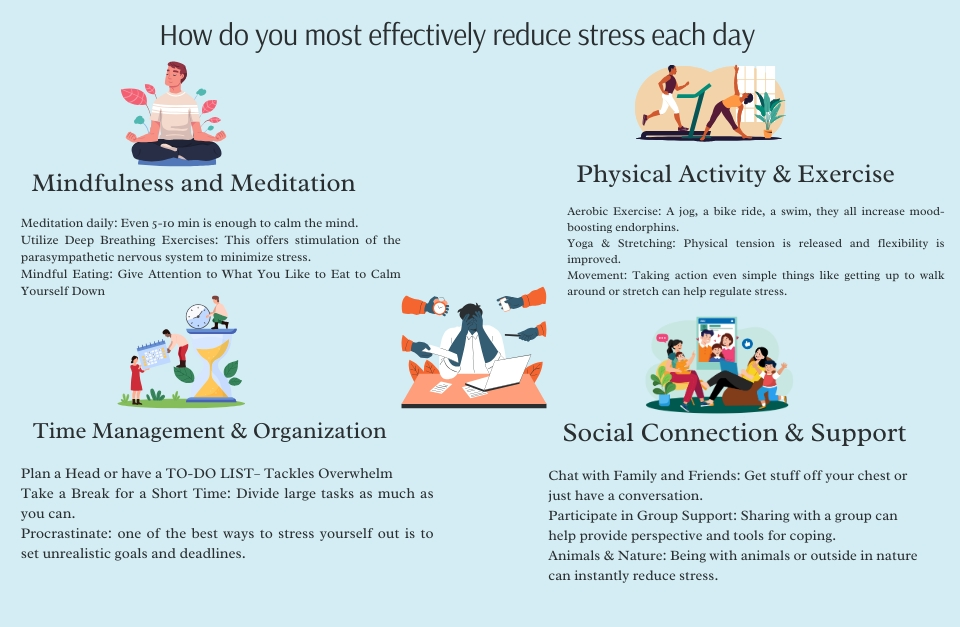Stress management strategies to boost mental health. Learn relaxation techniques self-care tips and effective ways to reduce stress in everyday life. Stress is a normal reaction to these demands, but when it becomes chronic, it can subtly undermine our emotional and physical health.
Before you do, take a deep breath and picture what life would look like if your days were a little lighter, your mind a little clearer, your energy a little more abundant. This blog walks you dial back your feelings of stress and provides soothing techniques you can use to get calm & take back control of your life. We’ll explore ways to build mindfulness and establish habits that infuse moments of calm into even your most hectic days.
Familiarity with the types of stress and its triggers
Stress is our body’s response to external pressure. It’s not necessarily a bad thing — stress can provoke action, hone focus, even be a factor in reaching goals. But when stress turns into a chronic state, it can start to take a toll on our physical and mental wellbeing.
The two common types of stress are:
- Acute Stress: Is short term and sudden, such as when preparing for a presentation or driving in traffic to attend a significant meeting.
- Chronic stress: Ongoing and persistent, chronic stress is triggered by things such as long-term financial problems and high-stress work environments.
Common triggers include:
- Life full of scheduled activity which is all about racing against time.
- Emotional events, such as divorce, loss, or conflict.
- Workplace burnout, where deadlines and expectations never pause.
- Big life transitions, like entering college or becoming a parent.
Reflection can offer clarity. What are the personal triggers for stress that you feel? Naming them is the first soft step toward wielding them at will.
scheduling overload stress management
An overloaded schedule is one of the most common culprits of stress. How running to catch up all the time can make us feel exhausted, overwhelmed, and always behind the curve. Here are some strategies to cope with this type of stress:
- Priority setting in responsibilities and roles: Write a list mentioning each of your commitments and prioritize it according to its significance and urgency. Try getting the most important things done before working through things less pressing. This can provide a sense of control and reduce Feelings Of Loneliness and being overwhelmed.”
- Learn how to say no: If you think something will overload you than you can say to the other person “sorry, I can’t help you with this, I have too much work”. Long term, establishing boundaries like scheduling time for all your to-dos, including rest, exercise, and errands, can help prevent schedule overload.
- Rest and recharge: Your mind and body need a break. Build breaks into the day, and make sure you get enough sleep at night. Even a 10-minute break is able to reduce stress levels.
Be sure to keep in mind that managing schedule overload is an ongoing process. Practice regularly self-care and not to burn out.
Effective Stress Management Strategies

Learn how to Tell Friends from Foes — and also a 2nd, very sensible way to live a half life. Below are some ideas to help you get started
Practices of mindfulness: Do mindfulness-building activities such as yoga, Meditation, or deep breathing. This can be used to quiet the mind and focus on the present moment.
Positive self-talk When negative thoughts start to creep in, practice positive self-talk by saying positive and supportive messages to you. This can help frame your mindset and perspective when dealing with stressor scenarios.
Exercise Regular exercise has been shown to lower stress levels while raising endorphins
Mindfulness and Meditation
Center yourself in the present with mindfulness. App-assisted, guided meditation, such as Calm or Headspace, can teach you calming techniques like deep breathing and body scans. Just a few minutes of stillness helps sharpen our mental clarity and quiets anxiety.
Imagine this: Sitting in a quiet place, eyes closed, breathing long, diaphragmatic breaths. Stress begins to melt away.
Exercise and Physical Activity
Aerobic activities, such as walking, dancing or swimming, release endorphins — nature’s stress-relief hormones. Yoga and Tai Chi especially interlace movement with Mindfulness so both body and mind receive revitalization.
Your Sleep and Nutrition Matters
How to Manage Stress Step One: Take Care of Your Body Develop a sleep hygiene routine where you turn the lights down low or sip tea before bed. Choose the right food — vegetables, proteins, healthy nutrient foods — avoiding excessive sugar and junk foods that accelerates the level of anxiety.
Stress Management Quotes for Kids
- And sometimes the most essential thing you can do is take a drop the whole thing and simply breathe. “ – Unknown
- “Remember you are stronger than you realize. Allow yourself to breathe and trust in yourself.’ – Unknown
- “A butterfly needs a little time to grow inside its cocoon, and you need some quiet time to take care of yourself too.” – Unknown
- “Be gentle with yourself when things get difficult. You have long and you deserve love and happiness.” – Unknown
- “Doing some little things you love and taking a break when you are stressed is a good way to feel better.” Don’t forget to have fun!” – Unknown
News of this kind becomes more prevalent every day, so remember children, keep calm and stay healthy. Spend the day doing something you love; take time for yourself; and be reminded that you are tough; you can handle anything that comes your way.
Stress Management at Work and Home

Your environment influences your stress levels dramatically. A calm environment is the first step toward calm itself, and by creating balance in your space, you lay the groundwork for that calm.
Setting Boundaries
At work, limit after-hours emails or clarify expectations for your availability. At home, find moments for self-care — even if that means 10 minutes with a nice book in a quiet corner.
Communication Techniques
By clearly communicating what you need or how you feel, you can avoid misunderstandings and minimize conflict. Focus on becoming a better listener and empathizer so that you can build stronger supportive relationships.
To Build Supportive Environments
Surround yourself with reminders of peace — photos of loved ones, calming playlists, or aromatic candles. A brave physical space where they can find refuge from outside chaos.
Different demographics coping strategies
Stress is shaped differently by different professions and lifestyles. Here’s how to home in on stress solutions:
For Working Professionals
Pay attention to exhaustion from work by taking regular breaks, reducing priorities, and participating in stress-relieving activities such as workplace yoga or mindfulness groups.
For Students and College Age Students
Navigate academic schedule overload with planners, by breaking up study blocks with stretches, and practicing gratefulness with journaling.
For Parents
Juggling family dynamics? Focus on meals together for closeness, practice deep breathing amid the chaos, and understand you do not need to be perfect. Support you to support your family.
Strategies to Manage Stress in the Long Run
Seeking Professional Help
Chronic stress deserves some focus. Therapists and psychologists suggest Mental Health Solutions just for you
The National Institute of Mental Health describes therapy and cognitive behavioral approaches as primary benefits for managing stress.
Building Resilience
Resilience isn’t about avoiding stress — it’s about thriving within it. Potentiate your mindset with daily gratitude moments and positive aspects of your life.
What is Stress and How Does It Affect Us?

Stress is a normal part of life, a natural reaction to the challenges and pressures we all face. It can come in many forms, be it due to work pressures, relationship dynamics, or unexpected life events. And, while some stress can be motivating — a little panic when the deadline looms! — too much can add up, outpacing our mental and physical well-being.
It can influence everything from our thoughts to emotions to our behaviours. It can create stress, fatigue, and irritability — all of which make it even harder to focus and be in a good mood. In addition, chronic stress has been associated with numerous health conditions, such as cardiovascular disease, depressed immune function, and an array of mental health disorders.
The first step to managing stress effectively is recognizing the signs and understanding how it affects us. Knowing how stress affects our lives, we can begin to build resilience and adapt strategies that allow us to find our calm in the eye of the storm.
How to Manage Stress and Why it is Important
In the dance of life, stress is often the unfriendly partner that we just can’t avoid. However, it is important to understand that stress management is a key aspect of maintaining our health. A: Stress management is all about protecting your inner peace — having a plan to mitigate and manage stress, allowing you to weather through life with ease. Why is stress management important? Here are some reasons:
- Better Mental and Emotional Health: Chronic stress negatively affects our mental and emotional well-being causing Anxiety Depression, and burnout. We can develop a positive mindset, enhance emotional resilience, and create inner peace when we manage stress effectively.
- Better Physical Health: Prolonged stress can affect our physical health, contributing to problems such as hypertension, heart disease, and weakened immune function. Stress management should be important for us to maintain our physical status at an optimal level of health and well being.
- Improved Cognitive Function: Stress can hinder our cognitive functioning, hindering our ability to focus, retain information, and make decisions. Why managing stress is importantManaging stress is important because it can greatly help cognitive (brain) function and thus, improve focus, clarity and productivity.
- Improved Relationships: Stress can take a toll on our relationships, impacting our mood, communication, and capacity to connect with others. Managing stress helps us maintain better relationships, allowing for communications couched in empathy and checking harmony at the door.
Remember, managing stress is a unique journey for everyone. It’s a case of what works for you and your life. Practice self-care, try different relaxation strategies and seek support when necessary. If we practice stress management, we can truly live a balanced, peaceful, and robust lifestyle.
How do you most effectively reduce stress each day?

During the commotion of daily life, dedicating time to relieve stress and care for oneself is essential. So, here are some soothing and effective practices that can help you in coping with the daily stress:
Mindful Breathing: Each day, take some time to intentionally focus on your breath. Breathe slowly through your nose, letting your belly rise, and breathe out through your mouth. This straightforward practice of mindful breathing signals to your body that everything’s okay, slowing down your heart rate and promoting relaxation.
Stay Active: Physical Activity not only promotes physical health but also helps to reduce stress. Whether by taking a walk, doing yoga, or engaging in your favorite workout, getting your body in motion also releases endorphins (think natural mood enhancers and stress relievers).
Here are five simple ways to help calm your mind: Practice Mindfulness or Meditation: Spend a few minutes every day practicing mindfulness or meditation. Everything will start to feel clear if you step away a bit — open up, close your eyes, take a breath. Pay attention to the sensations in your body, the sounds in your environment, the thoughts in the mind. It can help build a sense of calmness/presence in addition to reducing stress and improving overall well-being.
Get Natural: Nature is restorative for the mind and body. Walk in a park, sit by a lake, or spend some time in your garden. Just be in the moment absorbing all of the sights, sounds, and smells of the world around you. I immediately felt a sense of calmness wash over me, this connection with nature, this connection with the world outside helps to relieve stress, relaxation, and with it, a sense of restoration for peace inside.
Keep in mind, reducing stress is a journey, and something that works for one may not work for another. Find what resonates with you among these practices and make them your own —means to develop a health habit every day! These soothing practices can help you create more calm, strength, and peace in your life.
How does stress impact my physical health?
Stress affects your overall wellness and physical health significantly. When you feel stressed, your body secretes stress hormones, triggering a cascade of physical reactions. Chronic stress can gradually negatively affect your body, leading to all sorts of physical problems over time. Here are a few ways stress can affect your physical health:
- Impacts to the Immune Systems: Chronic stress can impair your immune system, making you more vulnerable to infections and illness.
- High blood pressure, heart disease and other cardiovascular issues: Stress can lead to these conditions.
- Digestive Issues: Stress can mess with your digestive system and cause stomachaches, indigestion, or even worsen conditions like irritable bowel syndrome (IBS).
- Muscle Tension and Pain: Stress can lead to the tightening of muscles, resulting in headaches, backaches, and other types of chronic pain.
- Sleep Disturbances: When experiencing stress, it can disrupt your normal sleep patterns, causing it to be tough for you to fall asleep or stay asleep, which can subsequently affect your general Health Care and well-being.
Stress can affect physical health, so beware and keep working to flatten the stress curve. By using relaxation techniques, self-care practices, and asking for support when you need it, you can create a healthier, more balanced life. As the saying goes, it’s never too late to find peace and happiness!
Can professional therapy help with stress management?

Absolutely! A professional therapist can also help manageable stress. Therapists are equipped with the skills to help people recognize and cope with their stressors, develop healthy coping skills, and be a safe space to navigate stress-related emotions. Therapy can help with stress management in the following ways:
Identifying Triggers: A therapist can work with you to recognize the exact situations or experiences that trigger your stress response. Once you understand what your triggers are, you can then learn how to either avoid or deal with them.
Building Coping Mechanisms: One other way, therapy can also help in reducing stress is by providing a safe space where healthy coping mechanisms for stress management can be developed. These could be things like relaxation techniques, mindfulness practices or cognitive-behavioral techniques.
Emotional Processing: A therapist can help you work through the emotions behind stress, offering a safe space for you to express and understand what you’re feeling. This is especially useful from a lesson on calming stress responses.
So Patricia I hope that you can get through this transition and on the other side of it you will be even stronger, more compassionate, and you will feel it too. Seek help from a professional therapist if you feel you are not able to cope and just completely stressed out and out of control, who can help lead you to healthier paths of dealing with stress. When you focus on your mental health and well-being, you can lead a healthier, more centered life. So take care of yourself, and reach out for help if you need it. You

